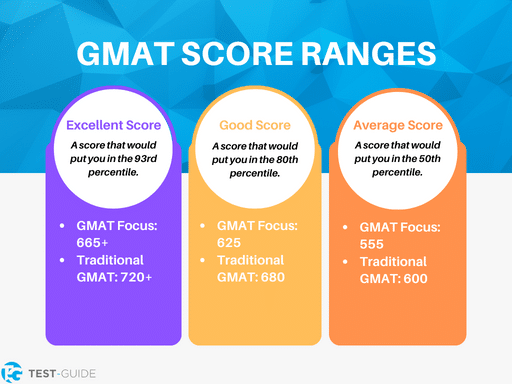A good GMAT score is anything that gets you into the program of your choice. If you have your eyes set on a top program, you will want a score of 665+ (on the GMAT Focus).
We cover everything GMAT score related in our guide below. Learn more about what a good score is, how the exam is scored, and how scoring has changed with the new GMAT Focus exam.
Good GMAT Scores Summary
We have summarized some scores in the table below and what they mean. We have listed both the GMAT Focus score and the corresponding Traditional GMAT score.
| Average Score | Good Score | Excellent Score | |
|---|---|---|---|
| GMAT Focus Score | 555 | 625 | 665+ |
| Traditional GMAT Score | 600 | 680 | 720+ |
| Percentile Rank | 50th Percentile | 80th Percentile | 93rd Percentile |
Starting in February 2024, the GMAT Focus exam will be the only version offered.
As with any test score, what is defined as “good” depends on your expectations and goals. If you want to get a top score, use our free GMAT practice tests to prepare.
How is the GMAT Scored?
This is one of the biggest differences when the GMAC updated the GMAT to the GMAT Focus exam. There is a new scoring system / method in place.
The most important changes are:
- Total Score: The New Total Score Scale is 205-805.
- All Sections Scored: All 3 Sections are Now Scored and Counted Towards Your Total Score.
- New Section Score Ranges: All 3 Sections Have a New Section Score Range.
- Data Insights: 60-90
- Quantitative Reasoning: 60-90
- Verbal Reasoning: 60-90
On the Traditional GMAT exam, you would take all 4 sections, but only 2 of them (Quant and Verbal) would count towards your total score. Now, all 3 sections contribute to your total score (equally weighted).
You will receive a score for each section (between 60 and 90). Your section scores are not based strictly on the number of questions you answered correctly. They are based on the following factors:
- Number of Questions Answered
- Whether the Questions Were Answered Correctly or Incorrectly
- The Difficulty of the Questions Answered
Those three section scores are then scaled to give you your GMAT total score between 205 and 805.
The GMAT Focus is still computer adaptive. The questions will get harder or easier depending on how you are performing on the exam.
GMAT Score Range
To better understand your score, it is helpful to know more about the GMAT score range. Here are the score ranges for the GMAT:
- GMAT Focus: 205-805
- Traditional GMAT: 200-800
GMAT Percentiles
Many students like to see how they stacked up to the competition. This is where GMAT percentiles come into play.
The table below outlines GMAT scores and the corresponding percentile for both the GMAT Focus and Traditional GMAT.
| GMAT Focus | Traditional GMAT | Percentile |
|---|---|---|
| 805 | 800 | 100% |
| 715 | 750 | 98% |
| 655 | 700 | 89% |
| 615 | 650 | 74% |
| 565 | 600 | 52% |
| 525 | 550 | 35% |
| 495 | 500 | 24% |
| 455 | 450 | 15% |
| 425 | 400 | 9% |
| 395 | 350 | 5% |
| 355 | 300 | 3% |
| 335 | 250 | 2% |
| 255 | 200 | 0% |
GMAT Section Score Percentiles
Review the table below to see where your section specific score stacks up.
| Score | Data Insights Percentile | Quantitative Reasoning Percentile | Verbal Reasoning Percentile |
|---|---|---|---|
| 90 | 100% | 100% | 100% |
| 85 | 99% | 89% | 96% |
| 80 | 86% | 66% | 60% |
| 75 | 51% | 35% | 19% |
| 70 | 24% | 14% | 4% |
| 65 | 10% | 4% | 1% |
| 60 | 4% | 1% | 0% |
Average GMAT Score
An average GMAT score is a score that puts you in the 50th percentile. For data from 2017-2022, the average GMAT score is 546 (on the GMAT Focus scale). Here is a breakdown of average scores by section:
- Data Insights: 74.41
- Verbal Reasoning: 78.99
- Quantitative Reasoning: 77.71
- Total Score: 546.01
All scores listed in this section use the GMAT Focus scale (205-805).
Important Note: All 3 sections contribute to your GMAT total score now. The section scores are all equally weighted towards your total score.
If you want to practice for these sections, visit our GMAT practice test page.
Receiving and Sending Your GMAT Scores
You will receive your unofficial score immediately after completing your exam. Your official score report is typically sent out to you within 7 business days.
After you receive your official score report, you will have 48 hours to decide if you want to send out your score report to schools. You will be able to send up to 5 score reports for free. Any additional score reports will incur a fee of $35.
You will receive an email when your official score report is available, so be on the lookout for that. You can also check your account.
The GMAT Focus exam added the option to be able to see your scores and then decide if you want to send them out to schools. You used to have to send out your scores before you saw them.
Factors to Consider for a Good GMAT Score
Since everyone will have some different definition of a good score, we have put together some factors you should consider when defining a good score.
- Does this score get you into the school / program of your choice?
- Does this score get you any scholarship money?
- Does this score align with the amount of study hours you put in?
Finding Your Goal GMAT Score
A great way to determine what a good GMAT score for you personally is to find your goal score. You can use the following 3 steps to find your goal score:
- Determine Schools You Want To Apply To: Every school has different requirements. Narrowing down your list will give you a better idea of what scores you need.
- Do Research on Scores for Those Schools: Many schools publish their data on scores previous students who were admitted received. This will give you a good benchmark.
- Set a Goal Score: We recommend looking at the 75th percentile scores from the schools on your list. a 75th percentile score will keep you competitive when it comes to the admissions process.
Improving Your GMAT Score
If you want to improve your GMAT score, there are a couple of different things you can do and focus on.
- Take a Practice Test: A practice exam will help you get a better feel for the exam, the types of questions, and the timing aspect of the exam. We offer free GMAT practice tests to help you prepare.
- Narrow Down Struggle Areas: You can narrow down your struggle areas after taking a practice exam. If you really struggled on Data Insights, you should focus your studies on that section.
- Consider GMAT Prep: Everyone studies differently. Some students will prefer to self-study, while others may prefer a best GMAT prep course. Find out what works best for you.
Frequently Asked Questions
What sections are included on the GMAT total score?
For the GMAT Focus exam, all 3 sections are included on the total score. They are all equally weighted.
The 3 sections are:
- Data Insights
- Quantitative Reasoning
- Verbal Reasoning
What is the score range on the GMAT?
The score range for the GMAT Focus is 205-805. It used to be 200-800 (Traditional GMAT).
What is an average score?
An average score is 546.01. This would put an individual in the 50th percentile.
Can you retake the GMAT?
You can retake the GMAT up to 8 times in your lifetime. However, you must wait 15 calendar days between retakes, and you cannot take it more than 5 times in a year.
How do I find my score?
You will get your unofficial score immediately following your exam (on the screen).
Your official score report will typically be sent to you within 7 business days. You will receive an email when this is ready. You can also sign into your account on mba.com and check there.
How long are GMAT scores valid for?
Your scores will be valid for 5 years from the date you took your exam.
Do I need to send my scores to schools?
You will have the option to send out your scores to schools. Once you receive your official score report, you will have 48 hours to decide if you want to send out your scores.


